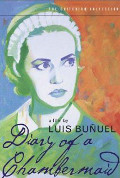
France 1964
Directed by
Luis Bunuel
95 minutes
Rated M
Reviewed by
Bernard Hemingway

Diary Of A Chambermaid
Buñuel’s take on Octave Mirabeau's novel which Jean Renoir had filmed with lacklustre results for Hollywood in 1946 with Paulette Godard playing the chambermaid was his first film back on French soil after his Latin American exile and also marks the beginning of the final and most successful stage of the director’s career. Working for the first time with scriptwriter Jean-Claude Carrière who would become his regular collaborator, Buñuel relocates the original text to 1930s France to mount a withering portrait of provincial mores and manners.
Jeanne Moreau plays Celestine, a young woman who leaves Paris to take up the position of chambermaid in the household of a well-to-do family in the West of France, near Cherbourg. The paterfamilias is Monsieur Rabour an old man with a shoe fetish, his daughter, the frigid Madame Monteil whose spineless husband (Michel Piccoli) who preys on the female staff when he isn't preying on the estate's wildlife. Rounding out the main characters is Joseph (Georges Géret), the Monteil's ultra-right bigot groundsman who rapes and murders a child and who Celestine sets out to entrap, using her own sexual allure as bait.
Much as with his previous film, The Exterminating Angel (1962), Diary Of A Chambermaid is mercilessly pessimistic (a very literal end frame depicts an approaching storm) not just about the bourgeoisie but provincial society in general, with Celestine, a Parisienne, virtually the only character (the only other exceptions are the child and a simple-minded laundress. victims each of the bourgeois and peasant villains) he depicts in a favourable light.
Buñuel’s only film in the anamorphic widescreen format, it is beautifully filmed by Roger Fellous in a classic pre-Nouvelle Vague style, Moreau is effective as the strong-willed chambermaid (although you've got to question her strategy for getting Joseph to betray himself) whilst the rest of the cast, Piccoli in particular, are excellent making this a telling portrait of the rise of fascism in pre-war France. (Those interested in the period may like to compare this film to Jean Renoir's La Règle du Jeu (1939) which deals with similar themes).
FYI: The right-wing demonstrators shouting "Vive Chiappe" at the film’s end is a reference to the chief of the Paris police who in 1930 banned L'Age D'Or after protestors destroyed the cinema where it was being shown).
DVD Extras: Audio commentary by Dr Adrian Martin, Monash University; An Angel in the Marshes, a 26m documentary on the film; original theatrical posters and trailer.
Available from: Madman
Want something different?





